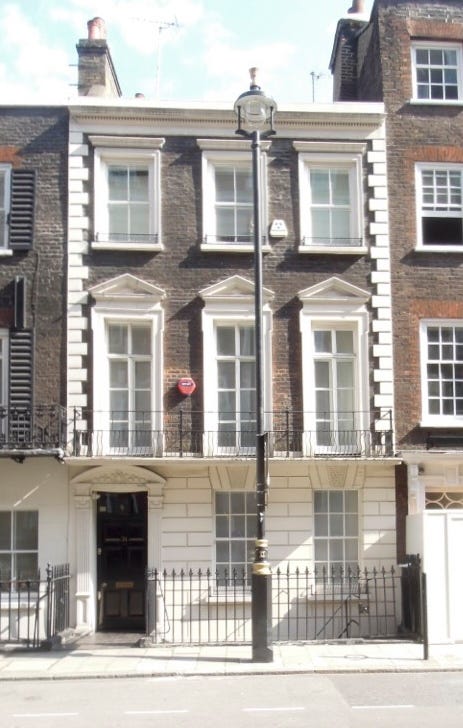Mighty Hoopla and Field Day: Victory for anti-festival campaigners
Plus: The Italian businessman ordered to fill his Mayfair basement with concrete.
Today we’re publishing late on Friday afternoon to bring you some breaking news that could upend the capital’s music festival scene and change how public parks are used across the city.
The Battle of Brockwell Park, a legal fight over whether commercial music festivals should be allowed to take over one of south London’s most popular open spaces, has resulted in a victory for local residents who oppose the scale of the events and believe they harm the environment.
In the last hour a judge has ruled that the local council should not have approved the construction of the Brockwell Park festival site without going through a full planning permission process.
The ruling leaves major question marks over whether a series of large 30,000-capacity music festivals due to start next week — including the LGBT-friendly Mighty Hoopla and Field Day — can still go ahead. The festival site is already in the process of being built.
The judge also said Lambeth council will have to pay £35,000 in legal costs to the residents and declined the council’s initial attempt to appeal. Crisis talks over the future of the events are now expected following the successful legal challenge which was crowdfunded by a group of local residents.
Scroll to the end to read the full details of the ruling and what this means for other public parks across the capital — or first read updates on other London stories.
London Centric has been shortlisted for Private Eye’s Paul Foot Award due to our commitment to investigative journalism. If you aren’t already a paying subscriber and want to support our journalism please join now for 25% off.
Pictured: The Italian businessman ordered to fill his illegal Mayfair basement with concrete.
Who among us hasn’t spent a decade asking the local council for planning permission to excavate a basement beneath our 18th century Mayfair townhouse, been refused, ignored the law and built the basement anyway, then been ordered to fill it in with concrete when the local council found out?
This is the fate of one homeowner, after Westminster council got wind of the damage to a Grade II-listed townhouse dating from 1729 on Park Street, just off Hyde Park.
No one answered the door when London Centric visited the property. But we can now name the owner of the house as Stefano Menconi, an Italian insurance executive, who holds the property through his Florida-registered company which paid £2.95m for the property in 2010.
When the council inspected the townhouse they found that in addition to his illegal basement Menconi had also made other extensive illegal alterations to the listed building including moving ceilings, removing original wood panelling, and installing air conditioning units. After spending a vast sum rebuilding the property without planning permission, he now faces an enormous bill to undo all the illegal work within a tight timeframe.
Menconi did not respond to multiple requests for comment. The Italian has a sideline as an art collector, where he describes his “ever-renewing research for art conceived as a space for soothing and nurturing the human mind and soul”. His interests on LinkedIn include Croatian yachts, Italian yachts, and an Italian-language newsletter about British planning law.
From Park Street, Mayfair to Park Street, Borough.
When London Centric wrote about the intriguing and complicated history of Omaze’s prize draw for a “£4.5m” London townhouse in Borough Market, we received one of the biggest reactions to a piece we’ve published. Many readers asked us to find out if Kim, the woman we encountered outside the property trying to manifest her way to victory, had been successful.
Kim had given us her number so we could attend the housewarming party, so we gave her a ring to find out.
“I didn’t win,” she said cheerily from her Croydon home, describing how she was already pinning her hopes on the next Omaze competition. To make matters worse, her manifestation trip to view it had been expensive, she said: “I got a £90 congestion charge fine for driving into the centre.”
Instead, the winner of the ex-council house in Borough Market is Roger Cana, a 37-year-old hospitality worker originally from Goa in India who currently lives in a rented studio flat in Hayes, west London. He is expecting his first child with his wife and plans to move into the property.
Legal fallout from messy London LTN row.
The debate over low-traffic neighbourhoods is one of the most toxic topics in London. Last week deputy high court judge Mr Tim Smith ruled that a LTN in West Dulwich, one of the most contentious schemes in the capital, was illegal because the council had failed to fully take into account an "impressive" and "highly relevant" 53-page presentation submitted by local opponents of the scheme.
London Centric understands that one of the document’s co-authors was local resident and LTN opponent Robbie Owen, who in his day job is one of the country’s leading planning lawyers at Pinsent Masons. In this capacity he knows Smith, the part-time judge and planning lawyer who ruled on the case and delivered victory to the residents.
The anti-LTN campaign group said that both men have “from time to time” had “professional dealings with each other representing clients on planning matters” and this was drawn to Lambeth Council’s attention before the hearing and publicly flagged in the courtroom.
Asked whether there were any concerns about the judge’s impartiality in the case, a spokesperson for the judiciary told London Centric: “It is fundamental to the role of a judge to remain impartial. Upon taking office, judges take the judicial oath where they swear to act ‘without fear or favour, affection or ill will’. If a judge considers there to be a conflict of interest it is for them to decide whether to recuse themselves or to raise the matter with the parties involved. In this case, the matter was dealt with at the outset of the hearing and neither party objected to the judge hearing the case.”
Mighty Hoopla and Field Day under threat after judge’s ruling, raising doubts over other festivals in the capital’s parks.
By Rachel Rees
A high court judge has ruled that Lambeth council should not have granted permission for a series of music festivals in south London’s Brockwell Park to go ahead, throwing the future of many of London’s summer festivals into doubt.
The ruling by Mr Justice Mould could also mean other major music festivals in parks across London this year may have to be curtailed or go through a full planning permission process to secure their future, opening up further legal challenges.
The Brockwell Live series of festivals is due to start next week, with 30,000 people a day set to descend on the south London park for events such as Mighty Hoopla, Field Day, Cross the Tracks, Wide Awake, and City Splash.
The process of building the festival site has already begun, including the erection of a fence around the site. The fence, which was compared by Oscar-winning actor Mark Rylance to a “prison camp”, has already been daubed with graffiti declaring “No fences” and “Whose park? Our park!”
The residents’ legal challenge hinged on the question of how long a section of Brockwell Park is actually out of action. Councils can allow a temporary change of use of space for a maximum of 28 days in a calendar year without the applicant going through a full planning permission process.
The festival organisers had argued that their festivals took place within this time window, so did not require planning permission.
The judge disagreed and ruled it is “self-evident” that Brockwell Live left the park out of action for more than 28 days due to the time it takes to take down the festival stages and remove the fences. As a result, he concluded the certificate of lawful development can “only be refused”.
The festival organisers may now need to either seek rapid planning permission from the local council for the events or reconsider whether they can go ahead. The organisers had already received planning permission for the separate Lambeth Country Show next month, which is unaffected by the ruling.
The ruling could also have major implications for other festivals in parks across London where public land is out of action for an extended period of time after an event has finished.
Protect Brockwell Park, the local community group behind the judicial review against the local council, raised more than £40,000 to cover its legal costs, with the council also expected to have spent a substantial sum on the case. Lambeth council has now been ordered to pay £35,000 towards the group’s costs.
The group’s co-founder Lucy Akrill, who first spotted the potential legal issue and organised the case, emphasised that this last-minute timing of the legal verdict on the eve of the festivals was not her group’s choice and insisted “the council has delayed, delayed, delayed”.
“They have forced us into this position”, she added, emphasising that legal action was the group’s final resort after months of attempts to urge the council to require proper planning permission failed.
The anti-festival case gathered widespread support among the community in south London, although some residents are in favour of the events. A pro-Mighty Hoopla campaign group calling itself SayYesLambeth, run by members of a gay rugby team who wanted to attend the festival, briefly emerged before fizzling out.
At a lengthy hearing Thursday on the judge emphasised the council’s “panoply of powers and duties”, from their “duty to hold the land for the enjoyment of the public” as they hold it on public trust, to their ability to host entertainment parks according to the 1967 Greater London Parks and Open Spaces Act.
He dismissed other concerns as beyond his jurisdiction, emphasising that his sole interest was whether the certificate of lawful development was granted fairly, or should be quashed, requiring a reapplication for planning permission.
Acknowledging Protect Brockwell Park’s complaints about damage to the park caused by the events, he said: “no one is suggesting that the normal use of the park is unable to be reinstated”, describing the question of whether the park “regains its amenity” as “a different question”.
Please forward this edition of London Centric to a friend, get in touch via email or WhatsApp, or leave a comment.








I hope the killjoys of Brockwell Park are happy with their contribution to killing off live music. What’s the betting they’ll oppose the planning permission process as well.
I don't think this implication is fair "The anti-festival case gathered widespread support among the community in south London, although some residents are in favour of the events. A pro-Mighty Hoopla campaign group calling itself SayYesLambeth, run by members of a gay rugby team who wanted to attend the festival, briefly emerged before fizzling out."
The festivals that take place sell out far in advance and clearly have more widespread support than the NIMBYs opposed if you choose to count them properly.